We were picked up promptly at the pier by our driver, Rajen
and we picked up our guide Pan a few minutes later. We made our way to the
Gateway of India to board the public ferry for Elephanta Island. We saw this
area on our last visit and the Taj Mahal Hotel is also located across the
street. It was about an hour-long ride to the island where 900 people live. We
passed many military ships and an island that housed a military building. It
was pretty “smoky” out so photos were a bit hazy. Lots of birds were following
the boat as the kid that works on the boat feeds them. Greg got some great
photos of them. Pan and I talked most of the way out to the island and back.
sunrise
sail in
views from the car
Gateway to India
Taj Mahal Hotel
the ferry port
on the ferry chatting with Pan
our ship
bathroom on the ferry
Here is some background on Elephanta Island by the tour
company:
“Once known as Puri or Gharapuri, Elephanta island was the
proud capital of a powerful coastal kingdom. It was named Elephanta by the
Portuguese, who took possession of it several centuries later, and found a
monolithic stone elephant at the place they first landed.
Today Elephanta is a World Heritage Site, showcasing legends
of Lord Shiva carved in rock cave temples. The cave complex is a collection of
shrines, courtyards, inner cells, grand halls and porticos arranged in the
splendid symmetry of Indian rock-cut architecture, and filled with exquisite
stone sculptures of Hindu Gods and Goddesses.”
Once on the island we got on a small slow train to take us
from the ferry to the site. There were a few monkeys there playing. Also, goats
and cows. There were vendors set up along the walk to the caves up lots of
steps. There were about 100 steps and if anyone found the climb difficult, they
could hire a chair-palanquin for around 1200 rupees or so per person.
approaching Elephanta Island
getting off the ferry
the ferry boats
long pier
here comes the slow train
We ran into Karen & Steve and Julie & Jeff on the
same ferry and the same train. We took photos of each other on the train.
the foursome
Pan facing the camera and us turning around
views from the train
low tide
mangroves
the chairs they will carry you in if you choose not to walk
goats in the doorway
the walkway up
entrance to the caves
inside the main room
the foursome leaving
bats
walking back to the ferry
reminded me of Panama.....
It was a very interesting place to visit. Our only
“complaint” was the guides’ ability to manage time. She kept saying we had
plenty of time, just relax and go slow. Then, when we got there she wanted to
tell us about each thing, but didn’t want us to take photos until after she
finished her talk. So, we sat in one place while she told us a lot of history
and then went site to site learning about each one. If we tried to take a photo
she would stop talking until she had our undivided attention. Then, she sat
down and said we could go take photos. (so, we retraced our steps) Now we were
running late and she said we didn’t have time for lunch.
The train was being repaired for the ride back to the ferry,
so we walked the relatively short distance. We stopped to get a couple of ice
cold diet Cokes to drink on the ferry ride back.
photos on the ferry ride back
We asked if we could get something quick like samosas and
eat them in the car since Dharavi was an hour away. She said that was a good
idea and we stopped at a street vendor and we grabbed 2 samosas each, a
container of fresh baked chocolate cookies and a couple of sodas for $6.00. The
samosas were very good. There was sauce to dip them in, but we didn’t open it
as it would have been too messy to eat in the car.
inside the car
lunch
samosas
samosas
on the drive to Dharavi
We stopped at a coffee shop to use their restrooms before
starting our walking tour of Dharavi.
Slum has a bit of a different connotation in the States than
it does in most other parts of the world. Many have decided that community is
more of an accurate description. The purpose of visiting the slum made famous
by the movie “Slum Dog Millionaire” is not voyeuristic to stare at the poor
people or “feel sorry” for them. They don’t need anyone’s judgment or pity as
they are a thriving and vibrant community of heard working people. They don’t
live off of the government and certainly aren’t lazy by any means.
There is no denying that compared to the poor in say the
States or Canada, they appear in far worse shape. Nothing could be further from
the truth. There are wealthy people in India and then there are the ones living
in tent cities or in shanties alongside of the road (or less). This community
is more of a “middle class” between the two.
Here is a description of the Dharavi tour:
“Many people know
Dharavi as the 'largest slum in Asia', but there is so much more to this
historic area of Mumbai than poverty. Dharavi's industries have an annual
turnover of approximately US$ 665 million. It’s actually the second largest
slum in Asia as the largest is in Pakistan.
Through our tour visitors experience a wide range of these
activities: recycling, pottery-making, embroidery, bakery, soap factory,
leather tanning, poppadom-making and many more. Most of these things are
created in innovative ways and in very small spaces!
When passing through the residential spaces, you will
undoubtedly feel the sense of community spirit that exists in the area. People
from all over India live in Dharavi, and this diversity is apparent in the
temples, mosques and churches that stand side by side. A tour through Dharavi's
narrow alleys is quite an adventure, and you will leave with an enlightened
sense of the purpose and determination that exists in the area.”
We stopped to pick up a college student named Furakan that
lives in Dharavi to take us on the tour with our guide Pan. He told us all
about how the community works so well together and about all of the different
industries there. They take great pride in their work and in the community.
Photography is not allowed and the tours are designed to
give you a better understanding of life there. They choose to live there. Our
guide said that even those that go to college stay there.
Living spaces are about the size of a king-sized bed, with
multiple people living there. Some have the factories below and they sleep on
the second floor. They recycle EVERYTHING! They sort out metals, plastics,
computer parts, paper, car parts and more. We saw them making suitcases and
backpacks, pottery, sewing and designing clothing. The people there work long
and hard hours. They live simply and are very happy. They don’t have stress or
care about things like politics and such. They work together and take care of
each other. I have to say it was quite inspiring to see how industrious they
are.
There was a bakery there and they were making puff pastry.
It smelled and looked really good and the guide asked if wanted to try some. Of
course, I said yes! It was so light and flakey. (better than on the ship) Hopefully,
we won’t regret eating street food and slum food. (we didn't)
views from the bridge
these young men asked to have their photos taken
their shop
I did get a couple of photos of some of the local kitties.
We were allowed to take photos from the bridge that goes over the train
station. There was one place where a couple of the guys asked to have their
pictures taken.
Furakan, our guide in Dharavi
Pan, our guide
Yes, there are a lot of people in such a small space, but
crime is all by nonexistent and everyone works together and they also share in
food and festivities. It really was a very special experience and we enjoyed
the visit very much.
The tour company gave us a small gift and it was coasters
that were hand painted by children in Dharavi. Colorful and cute! I already
made one into a magnet.
ride back to port
We made it back on time to the ship and we cleaned up for
dinner which offered many Indian dishes.
The show tonight was very good. It was Jane Cho playing the
electric violin. She is a Korean woman but lives in Australia, so she had an
interesting accent. (Kind of like in Panama where we have Chinese that speak
Spanish.) At the end of her show, she mentioned that she was newly married and
wanted to introduce her husband. It turned out to be Michael Falzon, the singer
from a couple of nights ago. They performed a song together which was really
good.
Now, for 2 much needed sea days before Dubai. Plus, we gain
another ½ hour tonight as we set the clocks back the other half hour to make a
full hour.
Thank you all for your patience with photos which won't be updated until after our 3 days in Dubai.

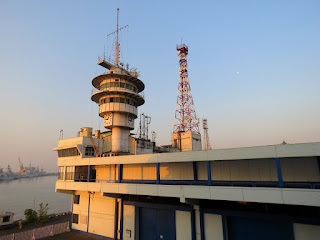




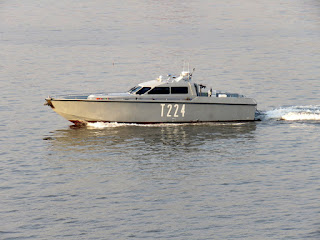














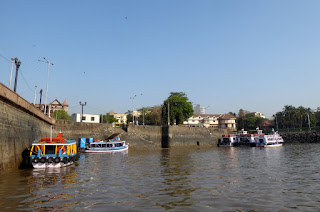








































































































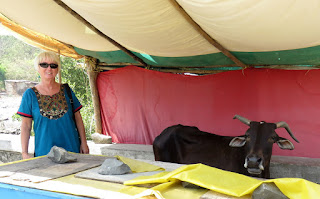














































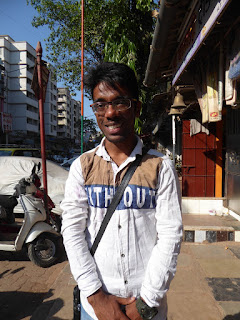







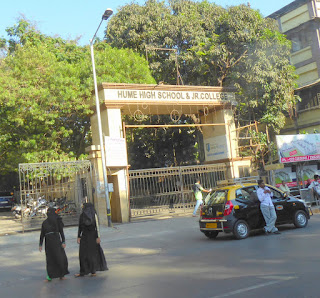




No comments:
Post a Comment